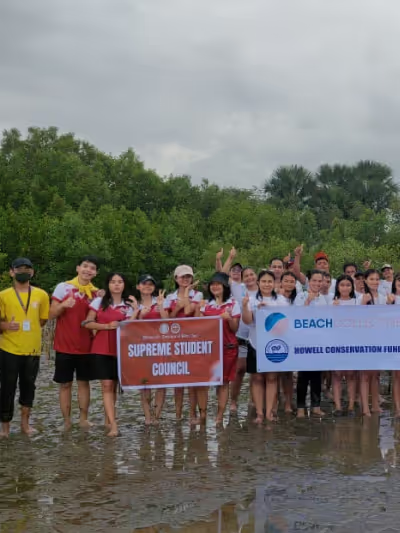In April 2022, our Founder and Executive Director, Brett Howell, traveled to New York City to take his place among this year’s Explorers Club 50 (EC50): Fifty People Changing the World, Class of 2022! The EC50 was designed to give recognition to explorers or scientists who are doing great work, but who are not necessarily known figures yet. This year, Brett joins a group of change-makers, innovators, and protectors who travel to the far reaches of the world in search of bettering it. According to the Explorers Club, "The Explorers Club 50 may well be the most important initiative our Club has ever undertaken...Naming these global exploration leaders to the EC50 shines a bright light on their extraordinary work and provides the recognition they so deserve.”

Brett’s relationship with the Explorers Club began in 2012, when he was invited to become a member due to his work in coral reef restoration with the Georgia Aquarium. This relationship expanded in 2019, when Brett and a team of scientists, journalists, artists, and others traveled to Henderson Island to study and clean up the world’s most polluted beach. This expedition was awarded the Explorers Club Flag 97, an exclusive honor reserved for those pushing the boundaries of exploration.
While the Henderson Island Expedition put Howell Conservation Fund (HCF) on The Explorers Club map, it was Brett’s follow-up work on global plastic waste reduction that led to his induction into this year’s EC50 in the ‘Innovator’ category. Shortly after the expedition, HCF began a partnership with the Center for Regenerative Design and Collaboration (CRDC). The organization has been developing a product called RESIN8, which up-cycles plastic waste and turns it into blocks that can be used for construction. Through multinational relationship building, HCF has become a global partner of CRDC, both as an implementation partner on plastic pollution expeditions and as a direct investor in the company. CRDC recently established a partnership with the Alliance to End Plastic Waste (AEPW) to dramatically scale up production of RESIN8 in Costa Rica and the USA. CRDC also launched a program with the United Nations Development Programme (UNDP) to educate youth, divert waste from landfills in Samoa, and create up-cycled value-added products.
In late 2021, HCF also established a partnership with the Blue Ocean Society for Marine Conservation, a nonprofit that engages students and their community in marine research and conservation efforts. For the last eight years, the organization has engaged ‘citizen scientists’ in beach cleanup efforts, collecting plastics and data around them. Supported in part by HCF, Blue Ocean Society will be embarking on the analysis of their long-term data collection. This research will help shed light on plastic pollution and help to identify local and address local waste streams. This project is conducted in partnership with New Hampshire Sea Grant, with additional support from The National Oceanic and Atmospheric Administration’s (NOAA) Office for Coastal Management and the New Hampshire Department of Environmental Services Coastal Program.

Additionally, HCF has been working over the past several years with the Ocean Plastic Leadership Network (OPLN), a diverse network of leaders and organizers working to end the flow of plastics into the ocean. In collaboration with the United Nations Environment Assembly (UNEA), this group is working toward developing multi-stakeholder treaties and initiatives that will rein in plastic pollution and create actionable solutions to the plastic epidemic. In particular, this effort is seeking to build legally-binding policies around plastic waste reduction. HCF’s involvement with this group exemplifies the holistic approach we take to plastic pollution as a systemic issue, recognizing that global collaboration and policymaking are necessary complements to hands-on cleanup efforts and technological innovations.
At the EC50 gathering at Explorers Club headquarters in New York City, Brett had the opportunity to share this work with a room filled with some of the most brilliant minds of today. Presenters ranged from scientists studying climate change through research into ice, insects, and other groundbreaking methods; filmmakers capturing conservation efforts on the far reaches of the planet; doctors studying medicine in space; and many others. While each of the EC50 members’ work was wildly different, what is important is that everyone is finding their own way to make the world a better place. At HCF, we look forward to staying in touch and collaborating with pioneers such as these explorers!
You can find out more about the EC50 Class of 2022 at the Explorers Club website.




